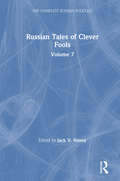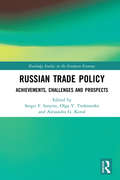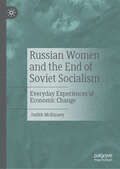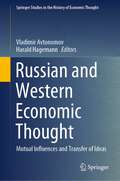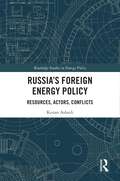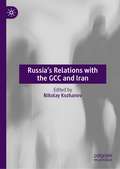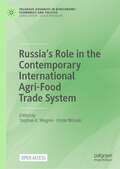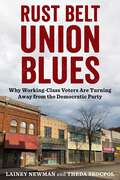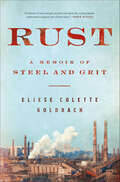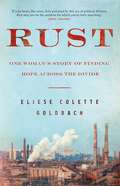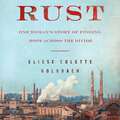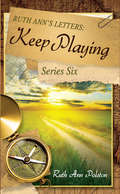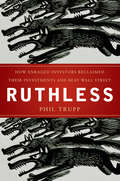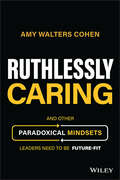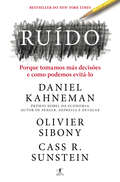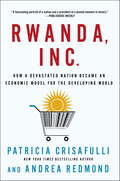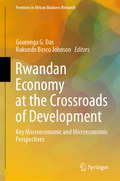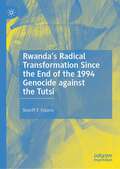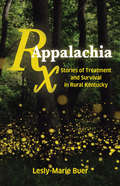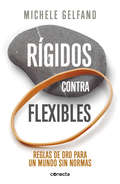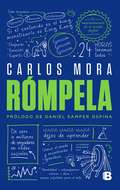- Table View
- List View
Russian Tales of Clever Fools: Complete Russian Folktale
by Jack V. HaneyThis is the concluding installment of a splendid multi-volume work that makes available to English readers a rich folktale tradition that has not been easily accessible or well-known in the West. Compared to other European traditions, the East Slavs have an extremely large number of tale types. Using the Aarne-Thompson index to folktale types, and drawing on both archival and written sources dating back to the early sixteenth century, J.V. Haney has assembled and translated examples of the full range of tales. Nearly all of these tales appear here in translation for the first time. The tales in this volume center on the so-called fool, the village simpleton. However, Ivan, the Russian everyman, turns out to have far more sense than his would-be oppressors. The greedy priests and landlords and dim-witted demons who try to take advantage of him are easily outsmarted. In the end it is they who are shown to be the fools as Ivan outwits or outlasts them. In these unequal contests lies the pleasure of the tales.
Russian Trade Policy: Achievements, Challenges and Prospects (Routledge Studies in the European Economy)
by Sergei F. Sutyrin Olga Y. Trofimenko Alexandra G. KovalThis book reveals the key trends in the modern Russian trade policy to provide a deeper understanding of the main challenges and barriers, possible paths and opportunities in its development. An international team of authors investigates specific factors influencing the Russian trade policy evolution; recent trends in Russia’s international trade development; and the impact of Russia’s participation in the World Trade Organization on the domestic economy. Particular attention is paid to regional integration processes that involve Russia and their outcomes; as well as challenges in the remaining and building commercial relations with Russia’s traditional and ‘new’ trade partners, taking into consideration those alienating the West and economic sanctions regimes. The analysis of key trends is combined with a special focus on selected industries and economic partners of Russia. The book contains a variety of case studies investigating the ways in which political and business actors adapt to the transformation of Russian trade policy, how Russia participates in the WTO dispute settlement mechanism, and what the driving forces and outputs are for the national economic agents. Finally, the authors consider what the reasonable expectations might be regarding the future prospects of Russian trade policy. The book presents a unique, comprehensive and multidimensional analysis of modern Russian trade policy. Filling an important gap in the existing literature, this book will be of value to all those interested in Russia’s economic development path.
Russian Women and the End of Soviet Socialism: Everyday Experiences of Economic Change
by Judith McKinneyInitially expected to bring efficiency to the Russian economy and prosperity to Russian society, the shock therapy of price liberalization, privatization and macroeconomic stabilization introduced under Boris Yeltsin was quickly condemned as having worsened the lives of most Russians. Based on conversations with more than two dozen women in a provincial Russian capital, this book takes a retrospective look at these economic policies and explores how they transformed the trajectory of the lives of these women- both positively and negatively- in the family and in the workplace. McKinney considers the everyday experiences of the women as they provided for their families, established businesses, travelled abroad, and adjusted to the new economic, political and social environment of the Late Soviet and Post-Soviet era. Through their divergent experiences, Russian Women and the End of Soviet Socialism casts light on how these women view issues of gender, ethnicity, domestic and international politics, and the end of the Soviet experiment.Students and scholars across a range of disciplines, including gender studies, sociology, economics and history, will find this book of interest.
Russian and Western Economic Thought: Mutual Influences and Transfer of Ideas (Springer Studies in the History of Economic Thought)
by Harald Hagemann Vladimir AvtonomovThis book examines the interrelations between Russian and European economics from the early 19th century to the present. It analyzes how Western economic thinking, such as classical economics and the marginal revolution, influenced Russian economic thinking and how Western economic ideas were modified and adapted to better reflect the specific Russian circumstances of the time. Moreover, the contributions in this book show how these modified ideas also influenced Western economists at the end of the 19th century, when Russian economics had reached the stage of professionalism and joined the international discourse on the discipline. Written by an international selection of respected experts, this book provides an overview of the most influential Russian economists and covers a wide range of topics such as the marginal revolution, the specific influence of Marxism, the evolution of mathematics and statistics in Russia in the 1890s–1920s, and the unique experience of building a planned economy in the Soviet Union. It is intended for all scholars and students who are interested in the history of economic thought.
Russia’s Foreign Energy Policy: Resources, Actors, Conflicts (Routledge Studies in Energy Policy)
by Kenan AslanliThis book examines Russia’s multidimensional foreign energy policy and the emerging and ongoing conflicts with energy-consuming and transit countries. Russia’s Foreign Energy Policy examines whether the interdependence patterns shaped through various channels (such as foreign trade, investment, finance, technology, and social interactions) between Russia and energy-importing countries could prevent energy-based conflict. Drawing on semi-structured expert interviews, Kenan Aslanli challenges the one-sided conventional wisdom that focusses on foreign policy ambitions and overlooks the peculiarities of the energy dimension. Instead, Aslanli highlights the complexity of contemporary energy affairs using a holistic approach that goes beyond geopolitics. He examines various energy types such as crude oil, natural gas, and nuclear and considers a diverse range of actors which include energy companies and international organizations. Using examples from Europe, Asia, and the Middle East, Aslanli demonstrates how the Russian strategy of using energy resources as a tool or energy weapon for foreign policy goals has a diminishing return in the long run. This book will be of great interest to students and scholars of energy policy, foreign policy, and Russian studies more broadly.
Russia’s Relations with the GCC and Iran
by Nikolay KozhanovThis book offers insight into the motives behind Moscow’s behaviour in the Persian Gulf (with a specific focus on the GCC member states and Iran), considering Russia’s growing role in the Middle East and its desire to protect national interests using a wide range of means. The book explores the drivers and motivations of the Russian foreign policy in the Gulf region, thus, helping the audience to generate informed prognosis about Moscow’s moves in this area over the next years. In contrast to most studies of Russia’s presence in the region, this book considers the Russian involvement in the Gulf from two standpoints – the Russian and foreign. The idea of the book is to take several key problems of Moscow’s presence in the Gulf, each of these to be covered by two authors—Russian and non-Russian scholars, in order to offer the readers alternative visions of Moscow’s policies towards Iran and the GCC countries
Russia’s Role in the Contemporary International Agri-Food Trade System (Palgrave Advances in Bioeconomy: Economics and Policies)
by Stephen K. Wegren Frode NilssenThis Open Access book analyses the emergence of Russia as a global food power and what it means for global food trade. Russia's strategy for food production and trade has changed significantly since the end of the Soviet period, and this is the first book to take account of Russia's rise as a food power and the global implications of that rise. It includes food trade policy and practice, and developments in regional food trade. This book will be of interest to academics and practitioners in agricultural economics, international trade, and international food trade.
Rust Belt Union Blues: Why Working-Class Voters Are Turning Away from the Democratic Party
by Theda Skocpol Lainey NewmanIn the heyday of American labor, the influence of local unions extended far beyond the workplace. Unions were embedded in tight-knit communities, touching nearly every aspect of the lives of members—mostly men—and their families and neighbors. They conveyed fundamental worldviews, making blue-collar unionists into loyal Democrats who saw the party as on the side of the working man. Today, unions play a much less significant role in American life. In industrial and formerly industrial Rust Belt towns, Republican-leaning groups and outlooks have burgeoned among the kinds of voters who once would have been part of union communities.Lainey Newman and Theda Skocpol provide timely insight into the relationship between the decline of unions and the shift of working-class voters away from Democrats. Drawing on interviews, union newsletters, and ethnographic analysis, they pinpoint the significance of eroding local community ties and identities. Using western Pennsylvania as a case study, Newman and Skocpol argue that union members’ loyalty to Democratic candidates was as much a product of the group identity that unions fostered as it was a response to the Democratic Party’s economic policies. As the social world around organized labor dissipated, conservative institutions like gun clubs, megachurches, and other Republican-leaning groups took its place.Rust Belt Union Blues sheds new light on why so many union members have dramatically changed their party politics. It makes a compelling case that Democrats are unlikely to rebuild credibility in places like western Pennsylvania unless they find new ways to weave themselves into the daily lives of workers and their families.
Rust: A Memoir of Steel and Grit
by Eliese Colette Goldbach"Elements of Tara Westover’s Educated... The mill comes to represent something holy to [Eliese] because it is made not of steel but of people."—New York Times Book ReviewOne woman's story of working in the backbreaking steel industry to rebuild her life—but what she uncovers in the mill is much more than molten metal and grueling working conditions. Under the mill's orange flame she finds hope for the unity of America.Steel is the only thing that shines in the belly of the mill...To ArcelorMittal Steel Eliese is known as #6691: Utility Worker, but this was never her dream. Fresh out of college, eager to leave behind her conservative hometown and come to terms with her Christian roots, Eliese found herself applying for a job at the local steel mill. The mill is everything she was trying to escape, but it's also her only shot at financial security in an economically devastated and forgotten part of America. In Rust, Eliese brings the reader inside the belly of the mill and the middle American upbringing that brought her there in the first place. She takes a long and intimate look at her Rust Belt childhood and struggles to reconcile her desire to leave without turning her back on the people she's come to love. The people she sees as the unsung backbone of our nation. Faced with the financial promise of a steelworker’s paycheck, and the very real danger of working in an environment where a steel coil could crush you at any moment or a vat of molten iron could explode because of a single drop of water, Eliese finds unexpected warmth and camaraderie among the gruff men she labors beside each day.Appealing to readers of Hillbilly Elegy and Educated, Rust is a story of the humanity Eliese discovers in the most unlikely and hellish of places, and the hope that therefore begins to grow.
Rust: One woman's story of finding hope across the divide
by Eliese Colette Goldbach''[a] memoir of modern American industrial life, written by the insider who got away - or got away enough to reflect intelligently on where they came from. Think JD Vance's Hillbilly Elegy and even Tara Westover's Educated . . . We could all learn from her example.' New York Times Book ReviewEliese wasn't supposed to be a steelworker. Raised by staunchly Republican and Catholic parents, Eliese dreamed of escaping Cleveland and achieving greatness in the convent as a nun. Full of promise and burgeoning ideals, she leaves her hometown, but one night her life's course is violently altered. A night that sets her mind reeling and her dreams waning. A cycle of mania and depression sinks in where once there were miracles and prayers, and upon returning home she is diagnosed with mixed-state bipolar disorder.Set on a path she doesn't recognize as her own, Eliese finds herself under the orange flame of Cleveland's notorious steel mill, applying for a job that could be her ticket to regaining stability and salvation. In Rust, Eliese invites the reader inside the belly of the mill. Steel is the only thing that shines amid the molten iron, towering cranes, and churning mills. Dust settles on everything - on forklifts and hard hats, on men with forgotten hopes and lives cut short by harsh working conditions, on a dismissed blue-collar living and on what's left of the American dream.But Eliese discovers solace in the tumultuous world of steel, unearthing a love and a need for her hometown she didn't know existed. This is the story of the humanity Eliese finds in the most unlikely of places and the wisdom that comes from the very things we try to run away from most. A reclamation of roots, Rust is a shining debut memoir of grit and tenacity and the hope that therefore begins to grow.
Rust: One woman's story of finding hope across the divide
by Eliese Colette GoldbachELIESE WASN'T SUPPOSED TO BE A STEELWORKER.Raised by staunchly Republican and Catholic parents, Eliese dreamed of escaping Cleveland and achieving greatness in the convent as a nun. Full of promise and burgeoning ideals, she leaves her hometown, but one night her life's course is violently altered. A night that sets her mind reeling and her dreams waning. A cycle of mania and depression sinks in where once there were miracles and prayers, and upon returning home she is diagnosed with mixed-state bipolar disorder.Set on a path she doesn't recognize as her own, Eliese finds herself under the orange flame of Cleveland's notorious steel mill, applying for a job that could be her ticket to regaining stability and salvation. In Rust, Eliese invites the reader inside the belly of the mill. Steel is the only thing that shines amid the molten iron, towering cranes, and churning mills. Dust settles on everything - on forklifts and hard hats, on men with forgotten hopes and lives cut short by harsh working conditions, on a dismissed blue-collar living and on what's left of the American dream.But Eliese discovers solace in the tumultuous world of steel, unearthing a love and a need for her hometown she didn't know existed. This is the story of the humanity Eliese finds in the most unlikely of places and the wisdom that comes from the very things we try to run away from most. A reclamation of roots, Rust is a shining debut memoir of grit and tenacity and the hope that therefore begins to grow.(P)2020 Macmillan Audio
Ruth Ann's Letters: Learning from the Lost and Found Bin, Series Six
by Ruth Ann PolstonThis book is for the lost and found. Some of us may be lost now, and all of us have been lost at one time or another. For those of us who are now found, we have "lost and found bin." These are the memories, the hurts, and the lesson we learned from being lost. It's tempting to act like our lost and found bin doesn't exist--and sometimes it's painful to revisit it. May this book remind you that God wants to use your lost and found bin to help someone else. Don't be afraid of it. For those of us who are lost in some way, take heart! We have a divine Guide Who wants to lead us home. Whether we are lost in confusion, lost in pain, lost in circumstances, or completely lost from our Maker, there is hope for us in Jesus Christ.
Ruth M. Owades
by Howard H. Stevenson Richard O. Von Werssowetz Robert W. KentRuth Owades developed a concept for a new mail order venture offering gardening products. Her current employer turned down the idea, so with permission to try it independently, she has begun the process of raising funds and preparing for a separate operation. She still has many uncertainties, but with a deadline approaching to meet the single selling season, she must decide to leave her job or give up the idea.
Ruthless
by Phil TruppRuthless is a candid exploration of the criminal subculture of Wall Street, and one of the first books to speak for the victims of the financial meltdown. On February 14, 2008, author Phil Trupp received a call from one of his brokers telling him a large portion of his investments were frozen--on ice--turning his life and plans for retirement upside down. When the fog started to clear, Trupp realized he was one of many investors caught up in what experts called the greatest attempted securities fraud in modern Wall Street history--a $336 billion scam which made the savings and loan scandal of the 1980s look like a simple street mugging.The path to destruction, financial or otherwise, often begins with a simple proposition. For author Phil Trupp it came from one of his stock brokers: "Take it, Phil. It's free money." This free money came from auction-rate securities (ARS). Auction-Rate Securities are corporate or municipal bonds with a long-term maturity for which the interest rate is reset at frequent auctions. ARS interest rates were higher than money markets and were sold as completely safe, liquid, Triple-A rated "cash equivalents," a deceptive sales pitch that lured hundreds of thousands of investors to buy the securities. Since 2008, most auctions have failed leaving the market largely frozen. The victims ranged from individual investors to the Joffee Foundation, a nonprofit that can no longer fund programs that help prevent AIDS in Africa, to the Port Authority of New York.While this is a classic 21st century tale of Wall Street greed and betrayal, it is also a story of redemption and the life-altering struggle of American investors and others around the world who, in the end, beat the Wall Street fraud-masters. Ruthless is a story of how individual investors became mad as hell and joined together to reclaim their cash investments. So far they've reclaimed more than $200 billion and continue fighting for the rest. A lively, page-turning guide for any investor with a stunning lesson on how to fight back and win.
Ruthlessly Caring: And Other Paradoxical Mindsets Leaders Need to be Future-Fit
by Amy Walters CohenA startlingly insightful exploration of contemporary leadership In Ruthlessly Caring: And other paradoxical mindsets leaders need to be future-fit, leadership strategist Amy Walters Cohen delivers a one-of-a-kind insight into contemporary business leadership. In the book, you’ll explore how the leadership environment is being radically redefined by 12 megatrends and how five paradoxical mindsets are necessary to achieving high performance and effective decision making in this new era of business. From ambitious appreciation to political virtue, humble confidence, and responsible daring, you’ll discover how to develop and expand your leadership identity. Whilst being heavily based in research, this revolutionary approach takes a practical look at the day-to-day realities of leading in business, offering fresh insight into how to tackle tough decisions, change behaviour, and evolve habits to become future-fit and thrive in a modern environment. The author shows you how to: Weave together multiple, seemingly contradictory, mindsets to enhance decision making and day-to-day leadership Adapt to the megatrends that are driving much of the change we see throughout the world Shake up the thinking, habits, and behaviours that are holding you back from unleashing your full potential as a leaderAn indispensable roadmap to leading modern organisations, Ruthlessly Caring is a must-read for c-suite executives, directors, senior managers, and aspiring business leaders who hope to perform well in their role and get the best out of themselves and the people they lead.
Ruído: Porque tomamos más decisões e como podemos evitá-lo
by Cass R. SunsteinPara entender como pensamos e aprendermos a pensar melhor, é obrigatório ler Ruído Do autor de Pensar, depressa e devagar e Prémio Nobel da Economia, Daniel Kahneman,em colaboração com Cass R. Sunstein e Olivier Sibony. Dois médicos na mesma cidade podem chegar a diagnósticos divergentes para pacientes idênticos. Dois juízes podem ditar sentenças diferentes para crimes semelhantes. Imagine agora que esses médicos e juízes tomavam diferentes decisões influenciados pelo facto de ser de manhã ou de tarde, ou por ser segunda-feira e não quarta-feira, ou porque ainda não almoçaram. Estes são alguns exemplos de ruído: variações em decisões que deveriam ser idênticas. O ruído está presente em todas as nossas decisões, individuais ou colectivas, e dá origem a erros de julgamento nos mais variados campos, incluindo na medicina, nos tribunais, na saúde pública, nas previsões económicas, nas ciências forenses, na protecção de menores e nos recursos humanos. Além disso, influencia-nos e prejudica-nos no momento de tomar decisões quotidianas mas cujo impacto e custo pode ser maior do que imaginamos. Daniel Kahneman, um dos psicólogos mais importantes da actualidade e Prémio Nobel da Economia, em conjunto com Cass R. Sunstein e Olivier Sibony, duas eminentes personalidades do pensamento estratégico, ensinam-nos a avaliar a origem desse ruído, cuja influência tendemos a ignorar, e a tentar reduzi-lo, para melhorar os nossos processos de análise e de tomada de decisão. Seguindo uma fórmula semelhante à do clássico contemporâneo Pensar, depressa e devagar, Ruído: porque tomamos más decisões e como podemos evitá-lo é um livro revolucionário que oferece soluções práticas e simples para aprender a pensar melhor.
Rwanda, Inc.: How a Devastated Nation Became an Economic Model for the Developing World
by Patricia Crisafulli Andrea RedmondEighteen years after the genocide that made Rwanda international news, but left it all but abandoned by the West, the country has achieved a miraculous turnaround. Rising out of the complete devastation of a failed state, Rwanda has emerged on the world stage yet again-this time with a unique model for governance and economic development under the leadership of its strong and decisive president, Paul Kagame. Here, Patricia Crisafulli & Andrea Redmond look at Kagame's leadership, his drive for excellence and execution that draws comparisons to an American CEO and emphasizes the development of a sophisticated and competitive workforce that leverages human capital. In Rwanda, the ultimate turnaround, strong and effective leadership has made a measurable and meaningful difference. Rwanda's progress offers an example for other developing nations to lift themselves out of poverty without heavy reliance on foreign aid through decentralization, accountability, self-determination, and self-sufficiency. The authors also explore Rwanda's journey toward its goal of becoming a middle-income nation with a technology-based economy, and its progress to encourage private sector development and foster entrepreneurship, while also making gains in education, healthcare, and food security-and all with a strong underpinning of reconciliation and unification. As so many nations stand on the brink of political and economic revolution, this is a timely and fascinating look at the implications of Rwanda's success for the rest of the continent-and the world.
Rwanda: National Economic Transformation
by Michael E. Porter Kjell Carlsson Haviland Sheldahl-Thomason Jem E. Hudson Kaia Miller Michael MccrelessSet in the year 2004, when Rwanda commemorated the 10th anniversary of a genocide that had claimed the lives of over 10% of its population. Focuses on the formulation of an economic strategy to rebuild the economy and its institutions after the devastation. Rwanda, one of the poorest countries in the world, highlights the challenges of economic development in Africa and in other low-income countries. Provides a brief political and economic history of Rwanda, but focuses on the country preceding and after the genocide. A description of government policies since 1994 enables discussion of the efforts of the transitional government under Bizimungu (1994-2000) and the first Kagame government (2000-2004) to restore and build the economy. Provides detailed economic and social data as of 2004, allowing evaluation of policy results. Concludes as President Kagame, now formally elected as head of state, considers an economic strategy to meet Rwanda's current challenges and increase the country's prosperity over the next decade.
Rwanda: National Economic Transformation
by Michael E. Porter Kjell Carlsson Haviland Sheldahl-Thomason Jem E. Hudson Kaia Miller Michael MccrelessSet in the year 2004, when Rwanda commemorated the 10th anniversary of a genocide that had claimed the lives of over 10% of its population. Focuses on the formulation of an economic strategy to rebuild the economy and its institutions after the devastation. Rwanda, one of the poorest countries in the world, highlights the challenges of economic development in Africa and in other low-income countries. Provides a brief political and economic history of Rwanda, but focuses on the country preceding and after the genocide. A description of government policies since 1994 enables discussion of the efforts of the transitional government under Bizimungu (1994-2000) and the first Kagame government (2000-2004) to restore and build the economy. Provides detailed economic and social data as of 2004, allowing evaluation of policy results. Concludes as President Kagame, now formally elected as head of state, considers an economic strategy to meet Rwanda's current challenges and increase the country's prosperity over the next decade.
Rwandan Economy at the Crossroads of Development: Key Macroeconomic and Microeconomic Perspectives (Frontiers in African Business Research)
by Gouranga G. Das Rukundo Bosco JohnsonThis volume represents a cornucopia of research studies coming out of an international conference held in Kigali, Rwanda in 2018. The essays comprise contributions on various microeconomic and macroeconomic policy angles that are crucial for a less developed economy to embark on a road to recovery to converge with the desired trajectory. The topics encompass a broad range of issues like the role of savings, capital formation, human capital, innovations, entrepreneurship, profit-shifting by multinational corporations, small and medium enterprises (SMEs), and firms’ strategies for achieving sustained and balanced growth. The chapters are organized under three major themes based on the commonality of areas that they cover: (i) Macroeconomic Constraints: Monetary Policy, Investments, and Population; (ii) Firms’ Performance, SMEs, and Role of Entrepreneurship; and (iii) Entrepreneurship and Business Performance: Strategies and Policies. It has a collection of 12 empirical studies that have an overall focus on macroeconomic policies such as savings among the rural poor; sustained investments in and development of capital markets; role of entrepreneurial sustainability; role of innovations for firms’ performance; healthcare reforms; the benefits of technology, policy incentives such as tax benefits for promoting growth, and strategic considerations such as marketing or positioning strategies; export strategies; and productivity enhancement via processing and profit sharing. With contributions from 27 authors, the studies bring forth knowledge about the factors that influence well-being via better technologies and innovations favoring productivity, firm performance, and their positive externalities in the food, nutrition, and health sectors. Given the wide-ranging coverage of top-down and bottom-up approaches and strategies for development, the book offers insights for policy interventions necessary for Rwanda’s gradual transition from agriculture to an industrial transformation via manufacturing and service-led development without smokestack industries.
Rwanda’s Radical Transformation Since the End of the 1994 Genocide against the Tutsi
by Sheriff F. FolarinThis book discusses the radical transformation of Rwanda, focusing on the dynamics of its society before and after the genocide against theTutsis in 1994. Through contextualizing the significant changes experienced by the country, it throws searchlights on a number of other African states facing similar challenges. The author analyses Rwanda's challenges of nationhood after the genocide; the vision and will of the country’s leadership; its social programs and strategies for cohesion and national development; the population’s resilience; and its growing regional influence in the twenty-first century. Rwandan society is here considered not only through the lens of existing literature on African politics, but also through direct engagement and fieldwork with local populations, scholars and policymakers. In addition, the book weighs in on narratives of survivors and victims of the genocide to understand and present local dispositions to current realities such as reforms, development plans, inclusive policies and programs, and determine how Rwandans deal with historical identity issues and conflicts. This book will be of interest to students, scholars and researchers interested in Rwandan and African politics, peace and conflict studies, security (strategic) studies, and genocide studies.
Rx Appalachia: Stories of Treatment and Survival in Rural Kentucky
by Lesly-Marie Buer&“Riveting . . . A necessary book for those seeking to understand the opioid crisis and the broader political economy of which it is part.&” —Jessica Wilkerson, author of To Live Here, You Have to Fight Prescription opioids are associated with rising rates of overdose deaths and hepatitis C and HIV infection in the US, including in rural Central Appalachia. Yet, despite extensive media attention, there is a dearth of studies examining rural opioid use. Challenging popular understandings of Appalachia spread by such pundits as JD Vance, Rx Appalachia documents how women, families, and communities cope with generational systems of oppression. Using the narratives of women who use or have used drugs, RX Appalachia explores the gendered inequalities that situate women&’s encounters with substance abuse treatment as well as additional state interventions targeted at them in one of the most impoverished regions in the United States.
Ryanair Holdings plc
by Mark T. BradshawExamines the valuation of an Irish airline that reported its first decline in net income in 2004 and saw a 30% stock price drop on the news. Ryanair is a low-cost, low-fare airline headquartered in Dublin, Ireland, operating over 200 routes in 20 countries. The company has directly challenged the largest airlines in Europe and has built a 20+ year track record of incredibly strong passenger growth while progressively reducing fares. It is not unusual for one-way tickets (exclusive of taxes) to sell on Ryanair's Web site for less than one euro. Having created profitable operations in the difficult airline industry, industry analysts and Ryanair itself have likened the airline to its U.S. counterpart, Southwest Airlines, and the common stock has attracted the attention of investors in Europe and abroad. Valuing Ryanair is problematic because of the general levels of uncertainty in the industry (i.e., fuel costs, labor, macroeconomic factors, etc.) and is exacerbated by the company's stated goal of actually decreasing fares each year.
Rígidos contra flexibles: Reglas de oro para un mundo sin normas
by Michele Gelfand¿Necesitamos reglas? ¿Podemos saltárnoslas para emprender y progresar? Una reflexión urgente sobre las reglas de oro para sobrevivir en un mundo sin reglas. ¿Por qué los relojes en Alemania siempre marcan la hora exacta mientras que en Brasil a menudo están atrasados? ¿Por qué es más posible que el conductor de un Jaguar se salte un semáforo rojo que el de una furgoneta? ¿Por qué algunas personas lideran con una disciplina férrea mientras a otras las normas nos les quitan el sueño? Las normas se han modificado en el seno de todas las culturas a lo largo del tiempo, a menudo dramáticamente, y continuarán cambiando, pero su código básico es intemporal. Al igual que el ADN influye en el color de los ojos o en la altura, nuestro rigor o flexibilidad ante las reglas influye en la motivación, la resolución de conflictos, la capacidad de negociación o la gestión empresarial. Da el primer paso y pregúntate: ¿soy rígido o flexible? Reseñas:«Gelfand ha contribuido enormemente al descubrimiento de los misterios de la motivación humana.»Robert Cialdini, autor de Influencia y Pre-suasión «Todos creamos un orden en nuestro día a día pero, tal y como nos muestra Gelfand, a unos nos gusta dibujar una línea y otros disfrutan cruzándola.»Jonah Berger, autor de Contagioso «Nunca volverás a ver tu lugar de trabajo, tu país o a tu familia de la misma manera.»Adam Grant, autor de Originales y Opción B «Revelador. Cualquier persona interesada en las diferencias culturales hallará en esta obra una visión innovadora.»Steven Pinker, autor de En defensa de la ilustración «Un libro brillante y oportuno. Michele Gelfand desvela una línea de falla universal que corre por debajo de países, empresas e incluso familias. Las culturas que se enfrentan a amenazas e incertidumbres buscan orden y precisión, mientras que las culturas conbases más firmes se permiten la ambigüedad y la toma de riesgos. Esta idea, a la vez simple y poderosa, cambiará para siempre nuestra forma de ver el mundo.»Daniel H. Pink, autor de La sorprendente verdad sobre qué nos motiva «Brilliante. Un libro que te hará verte a ti mismo y al mundo que te rodea de una nueva manera.»Barry Schwartz, autor de The Paradox of Choice
Rómpela
by Carlos Mora“Al cerrar la última página se sentirá inspirado para emprender cualquier esfuerzo digital, y sabrá la forma en que funciona el complejo mundo de los contenidos”. Del prólogo de Daniel Samper Ospina Carlos Mora fue una de las primeras personas en Colombia en darse cuenta de que el mundo del marketing estaba cambiando, que estaba empezando una revolución digital sin precedentes y que el futuro de la publicidad estaba ahí, en los creadores de contenido para redes sociales. Es por esto que hoy en día es el mánager de grandes influenciadores, entre los que están Ami Rodríguez, Amara, Sofía Castro, Sebastián Silva, Javier Ramírez, Yolo, Mariana Ávila, Nando, Panda, Carolina Manrique y Daniel Samper Ospina. En este libro el autor reflexiona, a partir de su historia de vida, sobre lo que necesitan tener en cuenta los emprendedores para sacar sus empresas adelante, y con anécdotas, consejos y ejemplos muy entretenidos, le ayudará al lector a entender por qué las redes sociales y el influencer marketing son cada vez más determinantes para "romperla" en los negocios.
